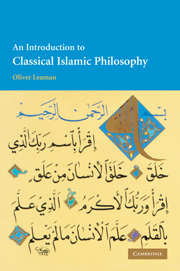Book contents
- Frontmatter
- Contents
- Preface to the first edition
- Preface to the second edition
- List of texts and abbreviations
- Introduction
- PART I AL-GHAZĀLĪ'S ATTACK ON PHILOSOPHY
- PART II REASON V. REVELATION IN PRACTICAL REASONING
- 4 Are the ethics of religion objective or subjective?
- 5 Happiness, philosophy and society
- 6 How to read Islamic philosophy
- Further reading
- Glossary
- Index of passages
- General index
6 - How to read Islamic philosophy
Published online by Cambridge University Press: 05 June 2012
- Frontmatter
- Contents
- Preface to the first edition
- Preface to the second edition
- List of texts and abbreviations
- Introduction
- PART I AL-GHAZĀLĪ'S ATTACK ON PHILOSOPHY
- PART II REASON V. REVELATION IN PRACTICAL REASONING
- 4 Are the ethics of religion objective or subjective?
- 5 Happiness, philosophy and society
- 6 How to read Islamic philosophy
- Further reading
- Glossary
- Index of passages
- General index
Summary
MYSTICISM
It is difficult to overemphasize the significance of what might be called mysticism within the Islamic philosophical world. Virtually all the major thinkers wrote on taṣawwūf (mysticism) or at least expressed some interest in it. Even al-Fārābī, one of the driest writers of philosophical prose, was reputed to be a mystic, although there is no evidence of this from his extant works. (On the other hand, the music which he is taken to have composed and which has survived does suggest some commitment to mysticism.) This interest in mysticism has lead some commentators to describe Islamic philosophy as incorporating the idea that it is impossible to pursue wisdom without at the same time pursuing God. That is, Islamic philosophy is taken to be much more holistic than, say, Western philosophy, which sees itself often as the technical investigation of particular concepts which we employ in our thinking about the world. This is even true of non-analytic philosophy, which often manages to get by without any explicit mention of God or even any general unifying principles of a transcendent nature. Some would defend the idea of philosophy as essentially holistic, an idea which the West has rather lost due perhaps to the Enlightenment and the growth of materialist theories. This possibly rests on a rather romantic conception of the East as the repository of a more holistic notion of life, while the West represents a more piecemeal conception.
- Type
- Chapter
- Information
- An Introduction to Classical Islamic Philosophy , pp. 191 - 236Publisher: Cambridge University PressPrint publication year: 2001



